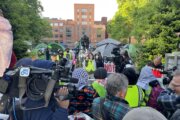CHARLOTTE, N.C. (AP) — Five years after North Carolina blocked an expansion of Charlotte’s nondiscrimination ordinance, prompting a backlash that cost the state billions of dollars, the city council unanimously approved expansive protections for LGBT people and vulnerable residents.
The ordinance approved Monday includes sexual orientation, gender identity, gender expression, pregnancy and natural hairstyles as protected classes, news outlets reported.
The ordinance applies to all employers — private as well as public, both big and small — despite a recommendation by city attorney Patrick Baker to limit it to businesses with 14 or fewer workers, rather than make the city handle a flood of complaints involving large employers.
The ordinance also prohibits discrimination against customers and visitors in places of public accommodation.
The ordinance doesn’t apply to religious organizations, including those with paid employees where a condition of employment requires adherence to tenets of religion. There’s also an exemption for private clubs or membership-based groups.
It does not cover protections for political affiliation and does not address public bathroom regulations.
It’s not clear how Charlotte will enforce the ordinance and how it will impact the city’s budget.
Mayor Vi Lyles referred the need for an enforcement mechanism to the Budget and Effectiveness Committee, which will develop recommendations for the full council to consider.
Most of the ordinance will go into effect Oct. 1, enforcement of the employment provision begins on Jan. 1.
North Carolina municipalities began acting to expand LGBT rights this year after the expiration of a moratorium on anti-bias ordinances that was created during efforts to remove House Bill 2, which became known as the state’s “bathroom bill.”
In 2016, the Republican-dominated legislature approved House Bill 2 and then-GOP Gov. Pat McCrory signed it into law after the city council sought to expand LGBT protections in Charlotte. The law also barred additional non-discrimination ordinances by towns and cities.
A key disputed section of HB2 required transgender people to use restrooms in many public buildings that corresponded to their sex recorded at birth. It drew national condemnation and prompted several large corporations and sports teams to relocate events to other states or reconsider expanding in North Carolina. The Associated Press found in 2017 that the law cost the state more than $3.76 billion, primarily from businesses that decided to skip intended moves to North Carolina.
In early 2017, the newly elected Democratic Gov. Roy Cooper and GOP legislative leaders approved a replacement law that repealed the bathroom requirement while also prohibiting local governments from enacting new nondiscrimination ordinances for workplaces, hotels and restaurants until December 2020.
Copyright © 2024 The Associated Press. All rights reserved. This material may not be published, broadcast, written or redistributed.







